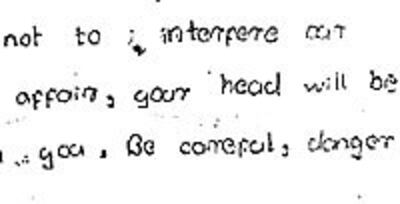
BANGKOK—The director of the United Nations’ labor watchdog has indicated that he has no plans to leave Burma despite numerous death threats against International Labour Organization (ILO) staff, ahead of a key meeting on the issue in Geneva.
Asked if he planned to leave the country, the ILO country director Richard Horsey told RFA’s Burmese service, “I think the fact that I am still speaking to you from Yangon is the answer to your question.”
Multiple anonymous threats to the ILO since its global report on forced labor singled out Burma as the worst offender have been reported to the Burmese authorities, Horsey said, adding that he was unaware of any official investigation.
The ILO’s governing body will meet to discuss basic labor rights in Burma, globalization, and employment issues, especially among the world’s youth at its headquarters from Nov. 3-18, the group said in a statement Thursday.
“Of course the authorities have been informed by the director general of the ILO and by the United Nations resident coordinator,” Horsey said. “Both have written to the prime minister of Myanmar [Burma] to inform them about these threats and ask that appropriate action be taken.”
Safety measures in place
“Of course it’s never pleasant to receive such threats to your life,” Horsey said. “And of course we have to take these things seriously. The United Nations takes very seriously any threats to its staff.”
“Measures have been put in place to ensure my safety—and I am not going to discuss more than that,” he said.
Horsey and his staff have received a number of death threats since issuing their report. One letter released by the ILO called the organization a CIA puppet and warned Horsey that “if you interfere [in] our internal affairs your head will be cut off and our people will crush you and poison you.”
Mass rallies in July and August followed, with speakers slamming the ILO and urging the ruling junta to withdraw from it.
“Of course the general climate created by such threats but also by these rallies around the country criticizing the ILO... [in] the climate created it is very difficult to work as normal,” Horsey said. “People don’t feel free to speak with me and this makes our work much more difficult.”
The ILO and other overseas groups have repeatedly called Burma’s secretive military junta to task for its continuing reliance on forced labor in state-sponsored development projects.
'No breakthrough'
In its recent global report, the agency said that while some improvements in the situation had occurred in central parts of the country, forced labor continued to be imposed in various forms, particularly in remote areas under the authority of the army.
But it admitted that it had made little headway in a country where the regime appeared to support current labor practices.
“No real breakthrough for effective action against forced labor in Burma has taken place,” the ILO report said.
“The Myanmar case thus demonstrates that it is impossible to make effective progress against forced labor when there is a climate of impunity and repression against persons who denounce forced labor abuses, in the absence of the political will to clamp down on the military and local authorities who are themselves deriving economic advantage from forced labor practices,” it said.
Original reporting in Burmese by Nang Kham Htwe. Written for the Web in English by Sarah Jackson-Han. Edited by Luisetta Mudie.
